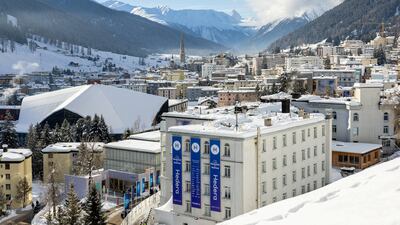Under the theme “Rebuilding Trust”, the World Economic Forum’s 54th annual meeting began in Davos on Monday evening.
As can be expected from the largest pro-globalisation event, there will be great focus on the world economy and ways to improve global collaboration to ensure greater economic returns.
With 2,800 official attendees and a couple of thousand additional attendees for side events outside the main event, the programme is packed with discussions on what the future holds.
Yet the meeting is faced with harsh realities of the present, especially with the Gaza war marking 100 days on the eve of the meeting, the Ukraine war heading for its third year, and economists sounding concern about the state of the world economy.
A series of news developments framed day one of the annual meeting. The first was tied to the outcomes of the meeting of national security advisers from 83 countries to discuss peace proposals for Ukraine. While there was African and Latin American participation, a lack of Russian and Chinese presence was notable.
On Tuesday, Ukrainian President Volodymyr Zelenskyy will address delegates with his ‘ten-point peace plan’, and Switzerland hopes to play a role in moving the plan forward.

No such efforts will be made publicly when it comes to the Gaza war, however a series of closed-door events seek to find tangible ways forward.
Noteworthy is the absence of any visible Palestinian participation – to the exception of the head of the Bank of Palestine and a couple of private sector leaders.
Meanwhile, the President of Israel, Isaac Herzog, is expected to take centre stage. Turkey has withdrawn its participation, but Iran is present with its Foreign Minister Hossein Amir-Abdollahian expected to address participants on Wednesday.
Strong Arab voices including the prime ministers of Qatar, Sheikh Mohamed bin Abdulrahman Al Thani, and Jordan, Bisher Khasawneh, are expected to make a case for a ceasefire and longer-lasting peace in the region during two separate sessions on Tuesday.
Meanwhile, Iraqi Prime Minister Mohammed Shia Al Sudani, and the Prime Minister of the Kurdistan region Masrour Barzani, will have the task of convincing global CEOs that Iraq is open for business, despite the continued attacks on bases housing US soldiers and general instability in the country.
The UAE’s participation is the largest yet - and its pavilion with the slogan ‘Impossible is possible’ is evident across sectors, with a focus on innovation and tech solutions.
Another announcement came in the form of a WEF report from key economists, the Chief Economists Outlook, in which 56 per cent of chief economists surveyed expect the global economy to weaken in 2024, with seven out of ten saying geo-economic fragmentation will pick up pace this year.
With a significant Chinese presence at Davos this year, many participants will be keen to hear if China’s growth will pick up and how geo-economic tensions with the US will play out in an election year.
With concerns about the economy increasing, funding gaps are another major concern, particularly for humanitarian organisation such as the World Food Programme and UN agencies whose heads are also participating in the annual meeting.
On Monday morning, the Bill and Melinda Gates Foundation announced its largest annual budget, with $8.6 billion to focus on a number of initiatives. Health is one of the main pillars of discussion in Davos, as Bill Gates and a number of advocates try to keep health on the agenda, despite Covid-19 fading in most people’s memories.
Long gone are the days of mandatory PCR tests and masks to attend the forum, and yet public health measures continue to need funding and innovation. The two pillars of innovation and financial support at a time of uncertainty and economic turbulence will be central to trying to find solutions that can show the true value of the World Economic Forum.


